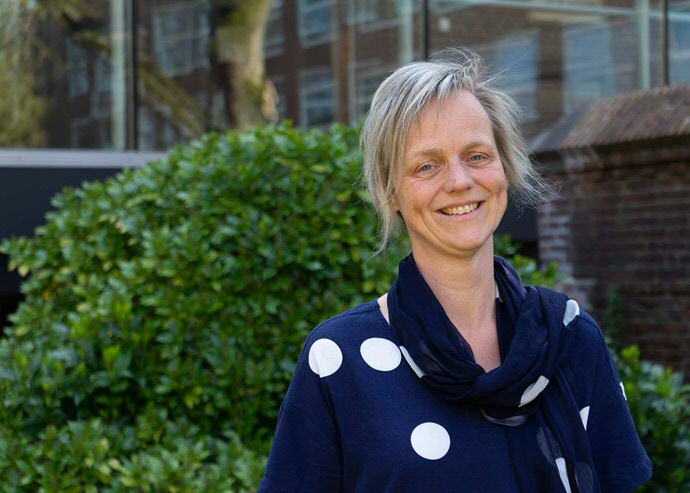Hanneke Muthert appointed professor Psychology of Religion
Hanneke Muthert has been appointed professor of Psychology of Religion at the Faculty of Religion, Culture and Society with a special focus on spiritual care and well-being. Time for some questions!
What does a religious psychologist actually do?
"One is not the other. The form religion takes - and what you study - is always colored by history and cultural context. And the psychological school also matters. My approach is colored by the psychoanalytic approach of my teacher and later supervisor Patrick Vandermeersch and my background as a theologian. What people do and do not believe is a cognitive aspect of their religion or worldview. But religious dynamics are more complex than that. And not everything about religion lends itself to 'objective' observation."
What fascinates you about this field?
"What fascinates me is perception. First, how people view the ground of their existence (emotionally) and in what ways they do and do not know how to connect with it. And secondly, how they simultaneously relate to an ever-changing outside world with its own dynamics. It is precisely this combination that makes a religious psychological perspective relevant, even in secular environments. It is always simultaneously about reflection on what is personally essential for people as well as on that which makes living together (im)possible."
And what are you currently engaged in?
"The core of my current research is how people constructively exchange about what really matters. I call that existential exchange. That turns out to be not so easy. Quite often 'I think so' or 'I feel this way' get in the way of our listening skills and reflective capacity. At the same time, we also want to be seen and heard, especially when life is difficult. One-on-one conversations then seem far from appropriate. Therefore, we investigate what the use of imaginative interactive objects adds to the field of practice of spiritual caregivers, for example in the earthquake region and with young people. Another research project is studying what spiritual care looks like in an ongoing European study of a psychedelic treatment for depression around the end of life. People may then have mind-altering experiences that they or those around them see as religious, spiritual or mystical. The question is how they discuss or shape these experiences in integrative sessions with their therapists. What is the role of the inner process and contextual factors in this? In this study, we hope to learn more about the meaning of psychedelic experiences not only for patients, but also for the clinicians and therapists involved. Is perhaps a new (secular) form of religion being created here?"
About Hanneke Muthert
Hanneke Muthert [Nijkerk, 1973] studied theology in Groningen and received her PhD in 2007 with Verlies en verlangen, een onderzoek naar verliesverwerking bij schizofrenie (Van Gorcum Publishers) with as her supervisors: religious psychologist Patrick Vandermeersch and psychiatrist Cees Slooff. By now she has been working at the University of Groningen for over 20 years, but only fairly recently full-time. Indeed, another track besides research and teaching is practice. With great pleasure she worked as a spiritual caregiver at GGZ Drenthe and in her own practice.

| Last modified: | 20 March 2024 3.13 p.m. |
More news
-
05 March 2025
Women in Science
The UG celebrates International Women’s Day with a special photo series: Women in Science.
-
10 February 2025
Project GRACE: An ENLIGHT ETN Grant Winner
We are happy to announce that the project GRACE, with Julia Martínez-Ariño as the main coordinator, is one of the projects selected for the ENLIGHT 2024 Call. Congratulations to the GRACE team.
